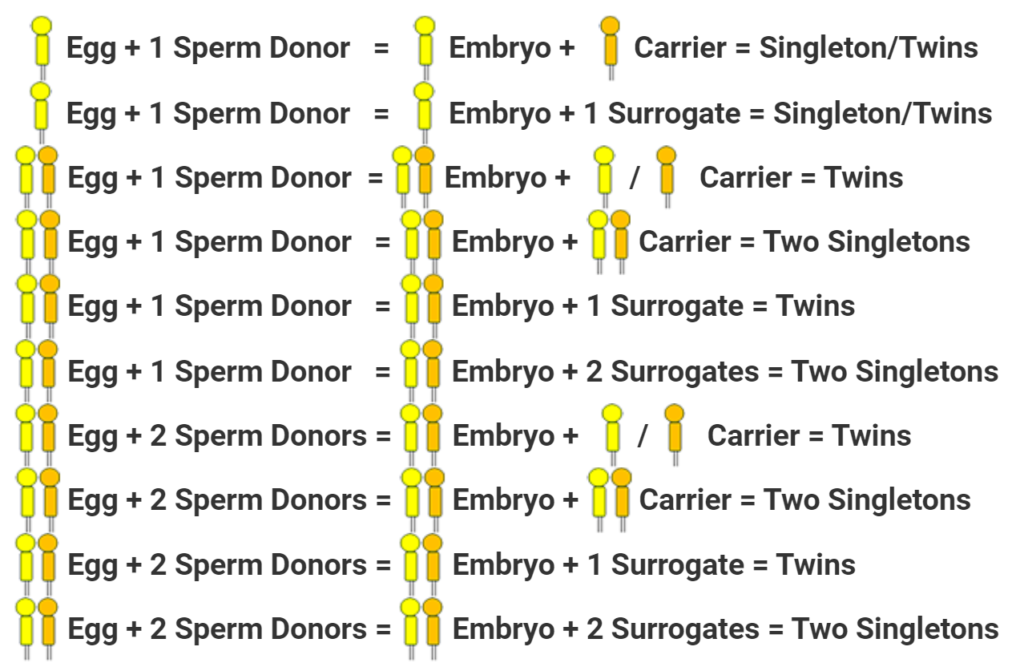TakePride campaign
We’re not born with pride. We take pride. Pride in celebrating who we were born to be.
Giving LGBT+ People the chance to become Parents

OneWorld Generations is devoted to standing by the LGBT community. The organization provides a safe space for LGBT persons to express their wishes and needs because of its LGBT personnel, some of whom have used surrogacy or egg/sperm donation to start families.
OneWorld Generations is committed to being an empathetic ear for the LGBT community and providing unwavering love, support, and hope to all members as they work to become parents. According to the group, children are the key to any LGBT family’s satisfaction and can provide unimaginable pleasure. Families that include LGBT parents thrive because of the unconditional love and care that these parents offer to their children.
All LGBT people, whether in a relationship or not, are encouraged by OneWorld Generations to think about the significant effect and satisfaction that having a child can provide. So, all members of the LGBT community must give plenty of thought before committing to it, according to OneWorld Generations.
OneWorld Generations is dedicated to listening attentively to the needs of every member of the LGBT community and strives to provide the utmost support, love, and hope in helping them realize their dreams of parenthood. The organization believes that children can bring immense joy and serve as a source of happiness in every LGBT family. By nurturing their children with unwavering love and care, LGBT parents create stable and harmonious homes where love remains forever fresh.
OneWorld Generations encourages all LGBT individuals, whether partnered or single, to consider the profound impact and fulfillment that having a child can bring. Each baby deserves to grow up in an environment filled with love and nurturing. In this light, OneWorld Generations urges every member of the LGBT community to carefully consider the various factors involved before embarking on this significant and life-changing decision.
When is the Best Time to Have Children?

Willingness
Have you and your partner discussed everything in detail before deciding?
How long have you been in a committed relationship, and how solid and trustworthy is it?
Is it possible to have family support while raising a child with a partner?

Finance
At this time, can you and your spouse afford to care for and rear a child?
Can you and your spouse afford to care for and rear a child now?
Could you and your spouse manage to pay for the surrogacy with the support of friends, family, or a loan?

Responsibility
Do you and your spouse share parental responsibilities for the family’s well-being?
Are you and your spouse emotionally and financially prepared to become parents?
How dedicated are you and your spouse to raising a kid together?

Planning
Give specifics on where you two intend to live, what you do for a living, how you intend to spend time with your parents and extended family, and any other plans you may have with your spouse.
How do you and your spouse want to raise a child? Considerations include the child’s upbringing, relationships with extended family, and educational and social experiences now and in the future.
I want to establish my family
Click below pictures for more information
We are men
We are women
LGBT FAQs
Among the many forms of surrogacy, two stand out: gestational and conventional.
Traditional Surrogacy
When a surrogate uses sperm from a man or a donor in an artificial insemination (IVF) procedure because she carries the eggs, the surrogate is technically a blood relative of the child. Due to the genetic connection between the surrogate and the baby, there is a certain amount of risk associated with this older kind of surrogacy.
Gestational Surrogacy
This kind of surrogacy involves the intended parents or a third party's egg and sperm, as well as a donor's egg and sperm or even donated embryos, carried and delivered by the surrogate. Crucial to gestational surrogacy is the fact that the surrogate does not have any familial ties to the child and alone carries the pregnancy to term.
We at the surrogacy agency think that everyone, regardless of their gender or sexual orientation, should be able to have a family. Surrogacy is a viable option for many people looking to have a family, and we help couples from many walks of life, including transgender people, single women, and homosexual men.
Our agency informs and assists all parties participating in the surrogacy agreement. We follow all relevant surrogacy rules and regulations. We are devoted to helping our customers realize their parental aspirations and think the process benefits all parties involved.
There are several critical things to keep in mind while choosing an egg donor:
You should consult a healthcare expert, such as a fertility specialist, to review your choices and any medical concerns.
Pick a trustworthy health center or organization: When searching for an egg donation facility, ensure it has a solid reputation and follows all ethical guidelines.
Look at donor profiles: Most clinics or agencies have profiles of possible egg donors. These profiles contain details about the donor's education, health, and hobbies, among other things.
Evaluate your top concerns: Before you look for an egg donor, consider what you are looking for. You could give more weight to shared hobbies, educational background, or physical appearance.
Inquire more: Ask the egg donor anything you want to know, such as why they want to contribute, if they have any health issues, or if this is their first time giving eggs.
Review any financial and legal agreements linked to egg donation, especially those about the donor's pay and any expectations about contact with the child.
Choosing an egg donor is an important life choice that you should take seriously and discuss with a medical expert.
The specifics of your arrangements with the donor and any applicable legal agreements will determine how much you can communicate with them about your egg donation.
When the donor prepares to donate eggs anonymously, the intended parents do not always know their names. Alternatively, the intended parent could choose an open or semi-open donation, where the donor and intended parent or child can communicate or share information to a certain extent.
If you choose an open or semi-open donation, talk to the donor and their legal guardians about the agreement's details. The agreement could include expectations for monetary or emotional assistance, rules for visiting or communication, and more.
Also, consult a mental health expert or support group if you feel the need, and think about how communicating with the donor or the child's biological siblings can affect your child emotionally.
Ultimately, it is up to the individual to decide whether or not to communicate with an egg donor; seeking advice from medical and legal specialists can help with this process.
In some cases, egg donation arrangements are made anonymously, meaning that the donor's identity is not shared with the intended parent or child. In other cases, the intended parent may choose to have a semi-open or open donation, in which some level of contact or information sharing is allowed between the donor and the intended parent or child.
If you choose to pursue a semi-open or open donation, it's important to discuss the terms of the arrangement with the donor and any legal representatives involved. This may include guidelines for communication or visits, as well as any expectations for financial or emotional support.
It's also important to consider the potential emotional impact of having contact with the donor or the child's biological siblings, and to work with a mental health professional or support group as needed.
Ultimately, the decision to have contact with an egg donor is a personal one and should be made after careful consideration of all options and with the guidance of healthcare professionals and legal experts.
In the context of in vitro fertilization, a "proven donor" is an egg donor who has previously conceived via the process and successfully generated fertilized eggs. Someone who has never given eggs previously and has no history of successful egg retrievals is referred to as a "first-time donor" in comparison.
Working with a proven donor increases the probability of success with the following reproductive treatments, which is why some intended parents or fertility clinics choose to work with them. Still, certain people, especially those donating blood for the first time, have exceptional success rates and can even be selected for this reason.
It is worth noting that both first-time and established egg donors undergo the same stringent screening procedures. To ensure they are healthy enough to donate eggs, all prospective donors undergo several tests, including mental health assessments, genetic testing, and infectious disease screenings.
Ultimately, the intended parent's or parents' choices, unique situation, and any relevant medical or ethical factors will determine whether they choose to work with a proven or first-time donor.
Whether the intended parent(s) and the donor make particular arrangements or enter into formal agreements determines the anonymity or knowledge of the egg donor.
Sometimes, egg donation arrangements keep donors' identities secret from the intended parent(s) or child. There are several valid reasons for this, such as the donor's desire for anonymity or to shield the donor from any emotional or legal obligations for the kid.
Another option is if the intended parents want to work with someone they already know, like a friend or family member, or if the donor is open to communicating with the intended parents or exchanging information.
The donor and the intended parent(s) or child(ren) can maintain some degree of communication or share certain information in an open or semi-open donation, which some intended parents can choose.
It is best to consult with healthcare providers and lawyers about the ethical and legal aspects of egg donation, which might change depending on whether the donor is anonymous or known.
Surrogates, or gestational carriers, are women who agree to carry another person's embryos to term in the hopes that they would be able to fulfill their family-building dreams. Many women decide to become surrogates for the following reasons:
Many women want to assist others who are having trouble conceiving because they have empathy and compassion after experiencing the pleasure of parenting.
The desire to make a difference: For some women, being gestational carriers is a means to improve the lives of others and contribute to the common good.
Surrogacy can help struggling women financially by giving them a steady cash stream.
Some women want to share their positive experiences with pregnancy and delivery with others since they had uncomplicated, straightforward pregnancies and births themselves.
As a result of personal ties, some women agree to carry a pregnancy to term for loved ones who are unable to conceive naturally.
A gestational carrier has seriously considered the decision and taken the necessary steps to prepare for it. Prospective gestational carriers should consult experts and complete comprehensive medical and psychological evaluations.
It is standard practice to conduct comprehensive medical and psychological evaluations on prospective surrogates to guarantee that they are in a suitable mental and physical state to bear a child for another couple. The specific processes used during the screening process might differ from one surrogacy service or program to another, but generally speaking, they include:
The agency will interview a surrogate candidate after they complete their first application, which details their background, health history, and way of life. Before beginning the surrogacy process, they can meet with a caseworker or coordinator to go over their goals and answer any questions they may have.
The surrogate will undergo several diagnostic procedures, including a physical examination, blood work, and infectious disease screens. They could also have an ultrasound and other diagnostic methods to assess their fertility.
To ensure the surrogate is emotionally and mentally stable enough to go through the surrogacy procedure, the agency will evaluate them psychologically. A clinical interview and standardized psychological tests are part of this process.
Evaluation by an attorney: A surrogate mother and surrogacy attorney would typically review the surrogacy agreement and get the surrogate mother's signature before proceeding with any medical treatments or receiving any financial compensation.
After that, the agency links the surrogate with the intended parents looking for a gestational carrier when they have received medical and psychological clearance. To make sure the surrogate is mentally and emotionally prepared to carry some person's child to term and that they are aware of all the duties and obligations that come with being a surrogate, there is a screening procedure. If you want your surrogacy journey to go well, it is crucial to collaborate with seasoned experts who can walk you through the screening process.
While specifics can differ from one surrogacy program or agency to another, the following points are necessities for anyone seeking to enter the field:
The age range for gestational carriers is typically 21–40 years old, while specific surrogacy programs are more lenient.
To become a gestational carrier, a woman must typically have a history of at least one healthy pregnancy and delivery.
Lifestyle and health: Gestational carriers have to maintain a healthy lifestyle, which includes avoiding drugs, tobacco, and excessive alcohol use, as well as excellent mental and physical health.
The ability of a gestational carrier to physically carry a fetus depends on their body mass index (BMI).
Geographical Consideration: States with surrogacy-friendly legislation are the most important when choosing a surrogate.
Stability in finances: Gestational carriers need to have a solid financial foundation and be able to sustain themselves while they are surrogates.
A solid support system, including an accepting partner or spouse, is essential for gestational carriers.
Choosing to become a gestational carrier is a huge step that requires a lot of thought and planning. Once they have undergone comprehensive medical and psychological assessments, gestational carriers should consult with seasoned experts who can walk them through the process and provide continuous assistance.
Legal procedures for homosexual men who choose to use surrogates to conceive a child might differ from one jurisdiction to another and from one set of facts to another. A broad summary is:
This document defines the arrangement's financial and medical duties.
In certain countries, the intending parents may need to get a court order prior to the birth to prove their legal parenthood. This may require proving a genetic link or satisfying other special legal requirements.
The law requires the intending parents to get a birth certificate upon the child's official arrival into the world. In specific cases, other evidence, such as a DNA test or a court order, is necessary to comply with the law. An adoption or parentage order is required in certain instances to establish the intended parents' legal rights further.
Gay men considering surrogacy should consult with experienced attorneys who can explain their options, answer their questions, and safeguard their parental rights performing extensive study and consulting with experts is essential.
You should talk to a lawyer who specializes in surrogacy law if you are thinking about utilizing one to have a baby. Protect your parental rights and make sense of the surrogacy legal procedure with the aid of an attorney.
Some of the ways a surrogacy lawyer can help are as follows:
An attorney can assist you in reviewing and creating legal agreements, such as a surrogacy agreement, which details both parties' financial and medical obligations, as well as any expectations for contact or parental rights..
Your attorney can assist you in communicating and negotiating with the surrogate and anyone else engaged in the surrogacy process. This includes meeting all the criteria for adoptions and parentage orders.
Helping you communicate and negotiate with the surrogate and anybody else engaged with the surrogacy process is something your attorney can assist you with.
Legal representation: Establishing your parental rights may require you to take your case to court. An attorney is there to represent your best interests and guide you through the legal process.
One way to ensure that your surrogacy experience goes well and is protected legally is to work with a surrogacy attorney. It is crucial to select a lawyer who is well-versed in the law and can provide individualized counsel and emotional assistance.
Usually, a legally binding contract is part of the surrogacy or egg donation arrangement. These contracts safeguard all parties' rights and interests and set out the conditions of the agreement in writing.
A surrogacy agency or a lawyer usually drafts an agreement on behalf of the intended parents and the surrogate. This document specifies each party's financial and medical obligations and any expectations about contact or parental rights. The agreement may also address termination of the pregnancy, selective reduction, and other possible consequences.
Financial remuneration, medical procedures, expectations for contact, and secrecy are some of the provisions in an egg donation agreement that both the intended parents and the egg donor typically sign. Possible genetic testing, egg ownership, and what to do with unneeded embryos are all topics in the agreement.
If you want your surrogacy or egg donation contracts to be enforceable in court, you should consult with seasoned attorneys who specialize in these areas. By outlining the rights and responsibilities of each party, these contracts might forestall confusion and conflict in the future.









